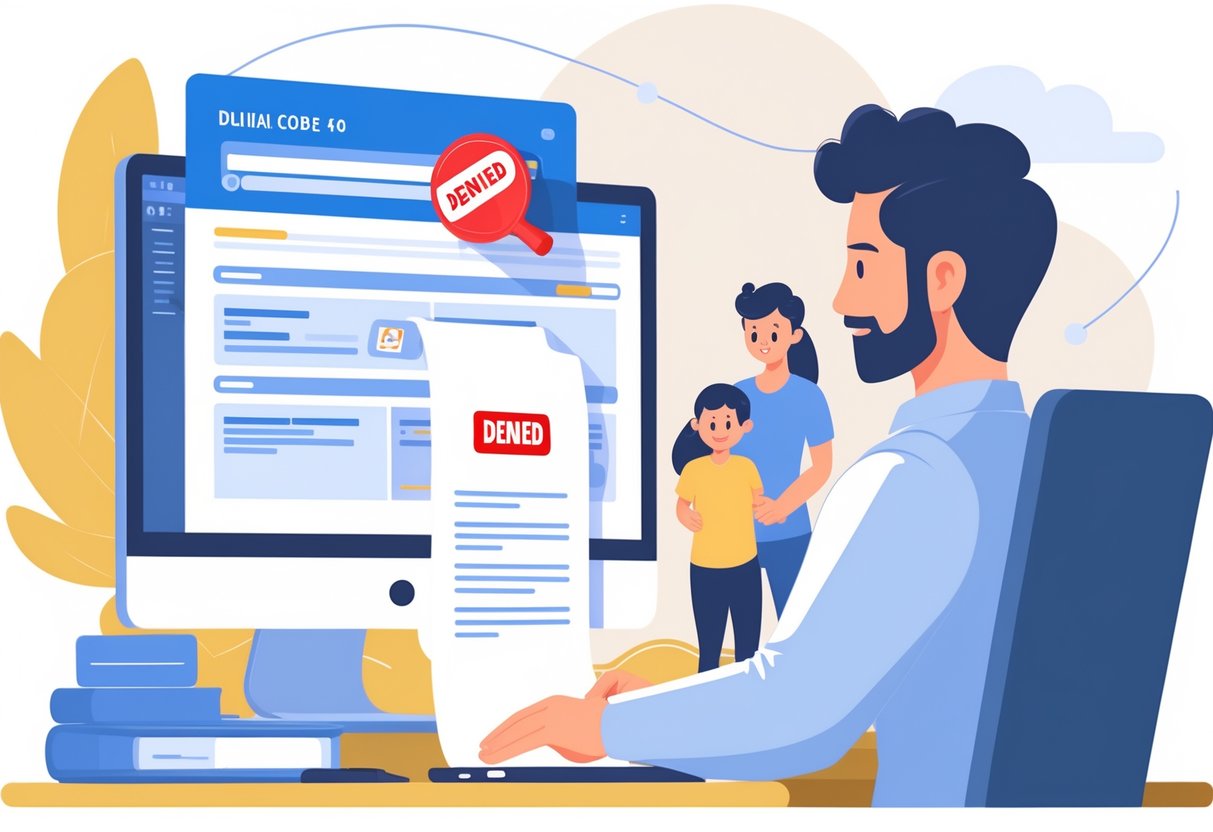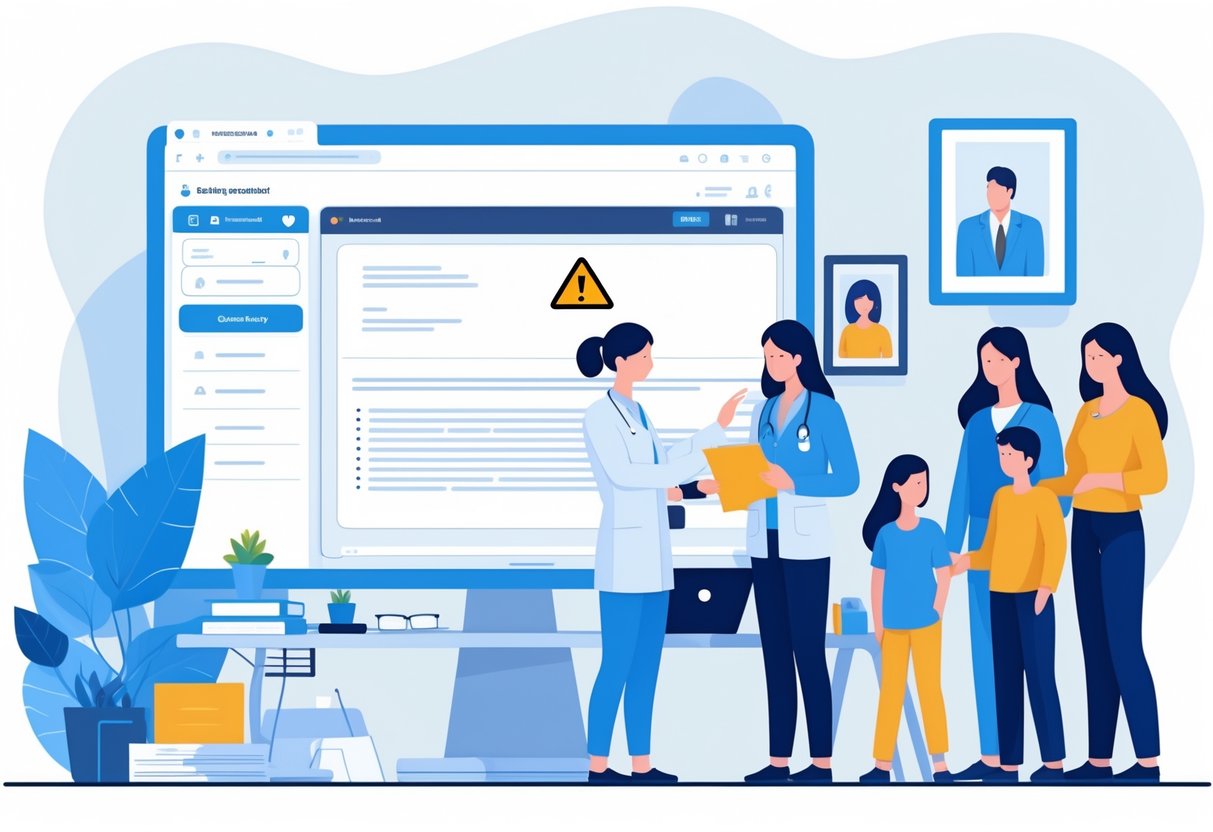Denial code 53 means your insurance will not pay for services done by an immediate relative or someone living in the same house. This code is used because these services are not covered under most insurance policies. Knowing this can help you avoid unexpected bills.

If a family member or housemate provides care, your claim is likely to be denied. Understanding why this happens can save you time and money when submitting claims.
You need to make sure the services are performed by a provider who is not related to you or living with you. This rule applies to many types of insurance plans, so it’s important to check before you get care.
Understanding Denial Code 53

Denial Code 53 applies when a medical service is provided by someone closely related or living in the patient’s home. This code stops payments because such services are typically not billable under insurance rules. You need to know what triggers this denial and how it affects claims.
Official Definition of Denial Code 53
Denial Code 53 means services provided by an immediate relative or household member are not covered by insurance. Immediate relatives include parents, children, siblings, spouses, or anyone in your direct family. Members of the same household can be any individuals living under the same roof, even if not related by blood or marriage.
This rule exists to prevent insurance claims for care that might not involve professional service or third-party providers. If your claim shows that the provider is too close to the patient, the insurance company will deny the payment using this specific code.
Context Within Medical Billing and Claims
In medical billing, you must verify the provider’s relationship to the patient before you file a claim. Insurance companies require proof that your service provider is independent. If a provider shares a household or family ties with the patient, the insurer considers the care informal or unsupported by third-party validation.
Denial Code 53 prevents unauthorized billing and protects from potential fraud. If your claim is denied for this reason, it often means you need to find a different, certified provider or correct the billing details before resubmitting.
Impacted Services and Provider Types
This denial often affects home care, therapy sessions, and visits from family caregivers. For example, if your parent helps you with nursing tasks and bills insurance, the claim will likely be denied.
Providers such as nurses, therapists, or aides living with the patient may face this denial. However, if the provider is licensed and unrelated, claims usually pass. You must check provider credentials and relationships carefully to avoid denials connected to Code 53.
Immediate Relatives and Household Members in Billing

You need to know exactly who counts as an immediate relative and a household member when dealing with billing. Each category has specific rules that affect whether services can be covered or denied.
Identifying Immediate Relatives
Immediate relatives usually include parents, children, siblings, spouses, and sometimes grandparents or grandchildren. These are family members directly connected by blood, marriage, or adoption.
For billing, many insurance providers do not cover services charged by these relatives to prevent conflicts of interest or fraud. This means if your claim lists services done by one of these relatives, it can be denied under denial code 53.
Defining Household Members for Claims
A household member is anyone living under the same roof as you. This can include relatives and non-relatives like roommates or partners.
Insurance rules often consider any person sharing your residence as a household member when deciding coverage. If a person in your household provides a billable service, insurance may deny the claim, assuming a lack of independence or objectivity in the service.
Relevant Federal Guidelines
Federal rules, such as those from Medicare and Medicaid, set clear limits on billing for services by relatives or household members. They strictly prohibit payments for these services to avoid fraud and abuse.
You must follow guidelines like the Social Security Act Section 1903, which denies coverage when direct family members or household members provide the service. Staying informed about these rules helps you avoid claim denials connected to denial code 53.
Consequences of Billing for Excluded Services
Billing for services that insurance excludes under denial code 53 can lead to serious problems. You might face claim denials that delay payments or even trigger audits. These issues could affect your practice’s cash flow and compliance status.
Common Scenarios Leading to Denial
You may see denial code 53 when billing for services done by a family member or someone living with the patient. For example, if a spouse performs a home health task and bills it as a professional service, insurance will reject it.
This also happens if a household member provides therapy or nursing care outside of an emergency. Insurers consider these services not valid for payment since they assume informal care does not require billing.
Being aware of who can or cannot provide billable services helps you avoid submitting claims that meet this denial. Always verify the provider’s relationship to the patient before billing.
Claim Rejection vs. Auditing Risks
When you bill for services excluded by denial code 53, the claim usually gets rejected immediately. This means you won’t receive payment until you correct or remove the disputed service.
Repeated billing errors can raise flags with payers and lead to audits. During audits, the insurer reviews your billing history for patterns of submitting excluded services. This may result in financial penalties or the need to return payments.
To reduce risk, keep thorough documentation proving who delivered the service and ensure it meets coverage rules. Consistent compliance protects your practice from financial loss and compliance issues.
How to Prevent Denial Code 53
You need clear steps to avoid denial code 53 related to services by immediate relatives or household members. Focus on properly enrolling providers and training staff to follow rules carefully.
Provider Enrollment Best Practices
Make sure you verify all providers during enrollment. Check for any family or household relationships connected to the patient. Use detailed questionnaires to capture this information.
Keep your provider database updated. Regularly review enrollments to catch changes in relationships or living situations. Document everything clearly to support claims if questioned.
Use electronic systems that flag family ties automatically. This reduces errors and speeds up reviews. Always confirm eligibility before submitting claims to avoid denials.
Staff Training and Compliance Checks
Train your team on rules about immediate relatives and household members. Explain why services from these providers are denied. Use case examples in training sessions to improve understanding.
Perform routine audits on submitted claims. Check if there are errors related to family relationships. Share audit results with staff and provide feedback to prevent repeated mistakes.
Create easy reference guides with the denial code 53 criteria. Make these guides accessible so staff can double-check claims before submission. Encouraging consistent compliance helps reduce denials.
Corrective Steps and Appeals Process
To address denial code 53, you need to gather specific documents and communicate clearly with the payer. Following these steps carefully improves your chances of getting the claim approved.
Required Documentation for Reconsideration
You must provide proof that the service was not performed by an immediate relative or household member, as the denial states.
This can include:
- A signed statement from the patient or provider
- Employment records showing the provider’s relationship status
- Notes or contracts proving the provider operates independently
Make sure all documents are dated, signed, and clearly related to the service in question. Missing or unclear paperwork often leads to repeated denials.
Communicating With Payers
When talking to payers, be direct and organized. Use a checklist to confirm you’ve submitted all required documents.
Keep detailed records of:
- Phone calls, including date, time, and person spoken with
- Written correspondence for reference
- Follow-up dates to avoid missing deadlines
Use formal language. Ask specific questions about what is needed to overturn the denial. Clear communication shows you understand the policy and are serious about resolving the issue.
Frequently Asked Questions
You may need to know how denial code 53 affects billing when a relative provides medical services. There are specific rules about appealing claims and exceptions to this denial code.
What are the implications of denial code 53 for family members providing medical services?
If a family member or someone in your household provides medical services, insurance will likely deny the claim. This means you cannot get payment for these services through standard coverage.
How can I appeal a claim denial based on code 53 for services rendered by a relative?
To appeal, you must provide proof that the services were medically necessary and done properly. You will also need to show that the provider met all qualifications apart from being a family or household member.
What are the exceptions to the rule outlined by denial code 53?
Exceptions include emergency care or when no other qualified provider is available. Sometimes hospice care or home health services from family may be allowed under strict conditions.
Are any medical services provided by family exempt from denial code 53?
In most cases, routine services are not exempt. Certain therapy or counseling services may be allowed if they are part of a recognized program and properly documented.
How does denial code 53 affect billing for household members’ medical services?
You cannot bill insurance for services by a household member. This means these services must be paid out-of-pocket or covered by other means.
In which circumstances is it possible to override a denial code 53?
The code may be overridden if there is clear evidence of necessity and no alternative provider exists. Approval from a medical review board or insurer may be needed.







1 thought on “Denial Code CO 53 – Services by an Immediate Relative or Household Member Are Not Covered: Understanding Coverage Restrictions”